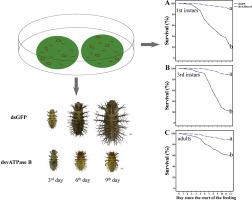当前位置:
X-MOL 学术
›
Pestic. Biochem. Phys.
›
论文详情
Our official English website, www.x-mol.net, welcomes your
feedback! (Note: you will need to create a separate account there.)
Double-stranded RNA targeting vATPase B reveals a potential target for pest management of Henosepilachna vigintioctopunctata
Pesticide Biochemistry and Physiology ( IF 4.2 ) Pub Date : 2020-05-01 , DOI: 10.1016/j.pestbp.2020.104555 Jing Lü 1 , Mujuan Guo 1 , Shimin Chen 1 , Jeffrey Edward Noland 2 , Wei Guo 1 , Wen Sang 1 , Yixiang Qi 1 , Baoli Qiu 1 , Youjun Zhang 3 , Chunxiao Yang 4 , Huipeng Pan 1
Pesticide Biochemistry and Physiology ( IF 4.2 ) Pub Date : 2020-05-01 , DOI: 10.1016/j.pestbp.2020.104555 Jing Lü 1 , Mujuan Guo 1 , Shimin Chen 1 , Jeffrey Edward Noland 2 , Wei Guo 1 , Wen Sang 1 , Yixiang Qi 1 , Baoli Qiu 1 , Youjun Zhang 3 , Chunxiao Yang 4 , Huipeng Pan 1
Affiliation

|
The development of genetic based techniques, specifically RNA interference (RNAi), has emerged as a powerful tool in novel pest management strategies for pestiferous coleoptera. The 28-spotted ladybird beetle, Henosepilachna vigintioctopunctata, is a dynamic foliar pest of solenaceous plants, primarily potato plants, and has quickly become one of the most important pests attacking many crops in Asian countries. In this study, we demonstrate the efficacy of dietary RNAi targeting vATPase B, which led to significant gene silencing. Downstream effects of vATPase B silencing appeared to be both time- and partial dose-dependent. Our results indicate that silencing of vATPase B caused a significant decrease in survival rate, as well as reduced the food stuffs consumption and inhibited the overall development of H. vigintioctopunctata. Furthermore, results demonstrate expression of insect melanism related genes, TH and DDC, was significantly up regulated under the dsvATPase B (RNAi molecule designed against vATPase B) treatment. The impact of oral dsvATPase B delivery on the survival of 1st, 3rd instars, and adults was investigated through bacterially expressed dsRNA. The effectiveness of RNAi-based gene silencing in H. vigintioctopunctata provides a powerful reverse genetic tool for the functional annotation of its genes. This study demonstrates that vATPase B may represent a candidate gene for RNAi-based control of H. vigintioctopunctata.
中文翻译:

靶向 vATPase B 的双链 RNA 揭示了 Henosepilachna vigintioctopunctata 害虫管理的潜在目标
基于遗传的技术,特别是 RNA 干扰 (RNAi) 的发展,已成为对有虫鞘翅目新型害虫管理策略的有力工具。28 斑瓢虫 Henosepilachna vigintioctopunctata 是一种动态的茄科植物(主要是马铃薯植物)叶面害虫,并迅速成为攻击亚洲国家许多作物的最重要害虫之一。在这项研究中,我们证明了饮食 RNAi 靶向 vATPase B 的功效,这导致了显着的基因沉默。vATPase B 沉默的下游效应似乎是时间和部分剂量依赖性的。我们的结果表明,vATPase B 的沉默导致存活率显着降低,并减少了食物消耗并抑制了 H. vigintioctopunctata 的整体发育。此外,结果表明,在 dsvATPase B(针对 vATPase B 设计的 RNAi 分子)处理下,昆虫黑色素病相关基因 TH 和 DDC 的表达显着上调。通过细菌表达的 dsRNA 研究了口服 dsvATPase B 递送对 1 龄、3 龄和成虫存活的影响。基于 RNAi 的基因沉默在 H. vigintioctopunctata 中的有效性为其基因的功能注释提供了强大的反向遗传工具。该研究表明 vATPase B 可能代表基于 RNAi 控制 H. vigintioctopunctata 的候选基因。和成人通过细菌表达的 dsRNA 进行研究。基于 RNAi 的基因沉默在 H. vigintioctopunctata 中的有效性为其基因的功能注释提供了强大的反向遗传工具。该研究表明 vATPase B 可能代表基于 RNAi 控制 H. vigintioctopunctata 的候选基因。和成人通过细菌表达的 dsRNA 进行调查。基于 RNAi 的基因沉默在 H. vigintioctopunctata 中的有效性为其基因的功能注释提供了强大的反向遗传工具。该研究表明 vATPase B 可能代表基于 RNAi 控制 H. vigintioctopunctata 的候选基因。
更新日期:2020-05-01
中文翻译:

靶向 vATPase B 的双链 RNA 揭示了 Henosepilachna vigintioctopunctata 害虫管理的潜在目标
基于遗传的技术,特别是 RNA 干扰 (RNAi) 的发展,已成为对有虫鞘翅目新型害虫管理策略的有力工具。28 斑瓢虫 Henosepilachna vigintioctopunctata 是一种动态的茄科植物(主要是马铃薯植物)叶面害虫,并迅速成为攻击亚洲国家许多作物的最重要害虫之一。在这项研究中,我们证明了饮食 RNAi 靶向 vATPase B 的功效,这导致了显着的基因沉默。vATPase B 沉默的下游效应似乎是时间和部分剂量依赖性的。我们的结果表明,vATPase B 的沉默导致存活率显着降低,并减少了食物消耗并抑制了 H. vigintioctopunctata 的整体发育。此外,结果表明,在 dsvATPase B(针对 vATPase B 设计的 RNAi 分子)处理下,昆虫黑色素病相关基因 TH 和 DDC 的表达显着上调。通过细菌表达的 dsRNA 研究了口服 dsvATPase B 递送对 1 龄、3 龄和成虫存活的影响。基于 RNAi 的基因沉默在 H. vigintioctopunctata 中的有效性为其基因的功能注释提供了强大的反向遗传工具。该研究表明 vATPase B 可能代表基于 RNAi 控制 H. vigintioctopunctata 的候选基因。和成人通过细菌表达的 dsRNA 进行研究。基于 RNAi 的基因沉默在 H. vigintioctopunctata 中的有效性为其基因的功能注释提供了强大的反向遗传工具。该研究表明 vATPase B 可能代表基于 RNAi 控制 H. vigintioctopunctata 的候选基因。和成人通过细菌表达的 dsRNA 进行调查。基于 RNAi 的基因沉默在 H. vigintioctopunctata 中的有效性为其基因的功能注释提供了强大的反向遗传工具。该研究表明 vATPase B 可能代表基于 RNAi 控制 H. vigintioctopunctata 的候选基因。











































 京公网安备 11010802027423号
京公网安备 11010802027423号